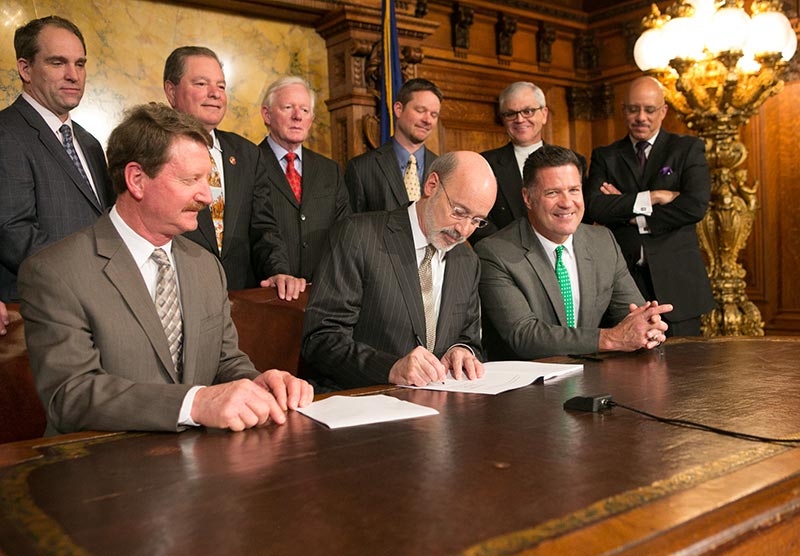 Governor Tom Wolf, center, flanked by sponsors Senator Elder Vogel, left, and Representative Mike Regan, right, signs Pennsylvania House Bill 941 into law as horse industry representatives look on.
Governor Tom Wolf, center, flanked by sponsors Senator Elder Vogel, left, and Representative Mike Regan, right, signs Pennsylvania House Bill 941 into law as horse industry representatives look on.
“Now we don’t have to worry about the Governor saying that racing is threatened with closing because it’s not going to be funded,” Brian Sanfratello says. “That will give the breeders and owners in Pennsylvania a sigh of relief. We won’t have to keep warning them of the possibility that racing will close.”
Sanfratello is Executive Secretary of Pennsylvania Horse Breeders Association (PHBA), one of the groups that had been working for months with legislators, the Governor’s office and the Department of Agriculture on the outlines of an expansive plan to reform Pennsylvania horseracing. On February 23 Governor Wolf signed HB941 into law, ending a contentious debate about how to fund oversight of the racing industry.
The new legislation amends the Administrative Code of 1929 and repeals the Race Horse Industry Reform Act of 1981. The 1929 code was a wide-ranging effort to establish standards for executive and administrative functions in the state, define the powers and responsibilities of the Governor and other administrators, create guidelines for appointing administrative officers, etc. A key part of HB941 dissolved the two Racing Commissions that were created in 1981 and replaced them with one Commission that would oversee horseracing.
Even as horseracing has changed dramatically in the past 30 years, there has not been—until now—comprehensive revision of the way the industry is governed. The state’s Department of Agriculture has been struggling to find the resources to ensure drug-testing and meaningful oversight of horseracing. The State Racing Fund was established in 1981 to provide operating revenue for two commissions—one for Thoroughbred racing, the other for Harness racing—to oversee the industry.
The fund had been collecting revenue from wagering taxes, license fees, admission taxes, etc. But there has been a precipitous decline in wagering on live racing in Pennsylvania since 2001. The resulting funding shortfall prompted the state Department of Agriculture to announce in 2015 that it could no longer maintain the two racing commissions, and that it could no longer fund the toxicology lab where blood samples of race horses are tested for banned substances. And in 2014 Auditor General Eugene DePasquale revealed that the Department of Agriculture had over-billed the State Racing Fund for at least three years, and that the Fund was nearly bankrupt. The legislature stepped in then with a transfer of $4.2 million from the Race Horse Development Fund to rescue the State Racing Fund from imminent bankruptcy.
Governor Wolf wanted the stakeholders and the legislature to revamp the aging funding model, and enact several reforms that had been proposed by Senator Elder Vogel in previous legislative sessions. Those reforms would shift some of the regulatory costs—such as drug-testing—from the state to the horseracing industry. In 2015 Wolf threatened to shut horseracing down in the state unless the funding imbalance was corrected. HB941, sponsored by Representative Mike Regan, achieved the reforms long sought by the Governor and legislative leaders.
New Commission, New Rules
The PHBA’s Sanfratello is optimistic about how the state will regulate racing going forward. “Well, I think it’s something that has been in the works for a couple of years now,” he says. “There are going to be people on the Racing Commission that are very knowledgeable in the industry.” The new nine-member Racing Commission will have four members from the racing and breeding industry—two from the Thoroughbred and two from Standardbred.
The reform moves the cost of drug-testing of horses from the State to the industry. The law requires random drug testing of horses entered in races, regardless of whether the horse is stabled on the grounds of the racetrack or shipped in for race day.
The law that established casino gambling in Pennsylvania was passed in 2004. The casinos were built at racetracks, and part of the rationale for legalizing casinos was to stimulate the state’s horseracing industry. Thus, the 2004 law required the casinos to promote horseracing as well as their slot machines. Evidence of actual marketing of horse racing is hard to find, though. But Sanfratello thinks that will change. He says that HB941 also renews the State’s commitment to promoting the industry. “With 941 there’s going to be a percentage of money put aside for marketing the racing industry. Initially it comes out to approximately $2.4 million.” He says that the stakeholders will get together and strategize about the best ways to market the industry.
Pennsylvania Secretary of Agriculture Russell Redding says that the road from wanting reform to actually seeing HB941 signed into law was not a smooth one. “But thanks to the involvement of the stakeholders, we were able to arrive at a sound compromise that accomplished our objectives: strengthening the integrity of horse and harness racing in the commonwealth, and putting in place a financial model that will allow for the long-term viability of the State Racing Fund.”




